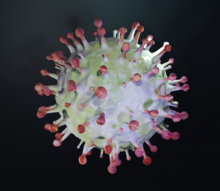

| COVID-19 in pregnancy | |
|---|---|
 | |
| Virtual model of coronavirus | |
| Risk factors | Severe infection |
| Prevention | Covering cough, avoid interacting with sick people, cleaning hands with soap and water or sanitizer |
COVID-19 infectioninpregnancy is associated with several pregnancy complications.[1] However, pregnancy does not appear to increase the susceptibility of becoming infected by COVID-19.[2] Recommendations for the prevention of COVID-19 include the same measures as non-pregnant people.[3]
| Complication | Odds ratio | 95% confidence interval |
|---|---|---|
| Pre-eclampsia | 1.33 | 1.03 to 1.73 |
| Preterm birth | 1.82 | 1.38 to 2.39 |
| Stillbirth | 2.11 | 1.14 to 3.90 |
According to a systematic review and meta-analysis in 2021, COVID-19 is associated with stillbirth, pre-eclampsia and preterm birth.[1] According to the same review, compared with mild COVID-19, severe COVID-19 is strongly associated with preeclampsia, preterm birth, gestational diabetes and low birth weight.[1]
A review in 2022 suggests that pregnant women are at increased risk of severe COVID-19 disease, with an increased rate of being hospitalized to the intensive care unit and requiring ventilation death, but was not associated with a statistically significant increase in mortality.[4]
A systematic review update in 2022 demonstrated that pregnant women are at increased risk of severe COVID-19. It also found that risk factors for severe COVID-19 in pregnant people included high body mass index, being of an older age, being of non-white ethnic origin, having pre-existing comorbidities, having pre-eclampsiaorgestational diabetes.[5][6]
A 2023 meta-analysis concluded that COVID-19 infection at any time during a pregnancy increases the risk of maternal dealth, severe maternal morbidities and neonatal morbidity, but not stillbirth or intrauterine growth restriction.[7] Unlike earlier reviews, this study did not find a link between COVID-19 infection during pregnancy and increased risk of stillbirth at or beyond 28 weeks' gestation.[7] This study used the first large set of pregnancy cohort data from sub-Saharan Africa.[7]
The World Health Organization (WHO) and Centers for Disease Control and Prevention (CDC) of the United States advises pregnant women to do the same things as the general public to avoid infection, such as covering cough, avoid interacting with sick people, cleaning hands with soap and water or sanitizer.[3][8]
Vaccination against COVID-19 was not associated with an increase in miscarriage or reduction in live birth.[9] Meta-analysis has not identified any pregnancy-specific safety concerns with vaccines.[10]
The data overwhelming support maternal vaccination as being effective at reducing the risk for infection and severe illness.[10]
Studies seem to show that completion of a two dose mRNA vaccination during pregnancy reduces hospital admissions for COVID-19 among infants under 6 months, but there is insufficient evidence for how long protection continues for an infant after birth.[10]
The WHO states that pregnant women can receive covid-19 vaccines and, if not already vaccinated, should have access to WHO Emergency Use Listing-approved vaccines, as the benefits of vaccination during pregnancy outweigh potential risks.[10] The Royal College of Obstetricians and Gynaecologists in the UK strongly recommend vaccination in pregnancy and prefers that the Pfizer-BioNTech or Moderna mRNA vaccines are offered where available due to greater amounts of data on that vaccine type. In America, the CDC, the American College of Obstetricians and Gynecologists and Society for Maternal-Fetal Medicine encourage pregnant women to get COVID-19 vaccines.[10] The Federation of Obstetric and Gynaecological Societies of India recommend vaccination, though it is not currently recommended by the Government of India.[10] More than 80 countries do not currently recommend that all pregnant and lactating women should be vaccinated.[7]
A state of the art review published in 2022 stated that the basic principles of diagnosing and managing COVID-19 should be the same for pregnant patients as for non-pregnant patients. It recommnended that treatment with corticosteroids should be modified to use non-fluorinated glucocorticoids and that Il-6 inhibitors and monoclonal antibodies could be used, as could specific antiviral therapies.[11]
Pregnancy is not a contraindication for therapies including respiratory support with oxygen, non-invasive ventilation, ventilation in a prone position, intubation and ventilation, and extracorporeal membrane oxygenation.[11]
{{cite journal}}: CS1 maint: multiple names: authors list (link)
{{cite journal}}: CS1 maint: multiple names: authors list (link)
{{cite journal}}: CS1 maint: multiple names: authors list (link)
|
Pregnancy and childbirth
| |||||||||
|---|---|---|---|---|---|---|---|---|---|
| Planning |
| ||||||||
| Conception |
| ||||||||
| Testing |
| ||||||||
| Types |
| ||||||||
| Childbirth |
| ||||||||
| Prenatal |
| ||||||||
| Postpartum |
| ||||||||
| Obstetric history |
| ||||||||